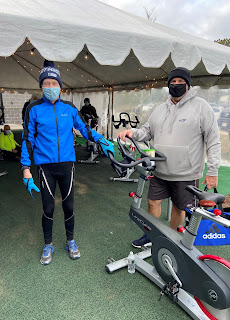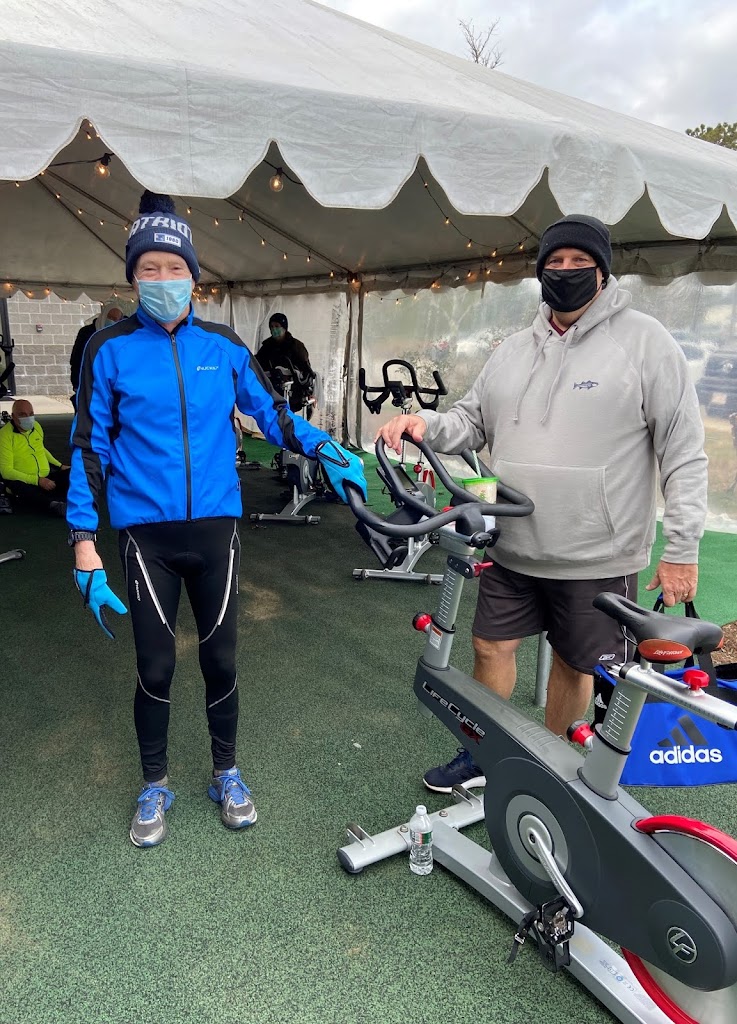Temperatures may be dropping but fitness classes are continuing outdoors. Learn how to properly dress and prepare
yourself for winter weather workouts.
Choose
the right fabrics.
 |
| Who wore it better? |
Some
fabrics are designed to pull sweat, heat and moisture away from your skin
allowing it to quickly evaporate and keep your body cool. Look for breathable, wicking materials like
high quality polyester, polypropylene,
wool and silk.
For
example: Nike Dri-FIT, Under Armour ColdGear.
On
the other hand, cotton fabric will absorb sweat and make your clothes feel wet
and heavy. You also want to avoid
fabrics that don’t breathe. Rubber-based
or plastic-based materials will trap in your sweat and keep it from evaporating
while simultaneously raising your body temperature.
Dress
in layers.
The
best way to stay warm and dry while exercising outdoors is to dress in
layers. The number of layers worn will
vary based on temperature, humidity levels, activity levels and personal
preference. Your body generates a
considerable amount of heat while exercising which can actually make it feel
about 15-20 degrees warmer out then it actually is. It is important that you don’t overheat
because that can lead to excess sweating and overheating. Layer up so once you warm up and start to
sweat, you can start discarding layers. Once you start cooling down, put your layers back on to avoid getting too
cold.
There
are 3 layers to consider:
- The
Base Layer – The
purpose of the base layer is to wick moisture away from your skin. The base layer is usually tight fitting in
direct contact with the skin. - The
Mid Layer – The
mid layer is to insulate and keep you warm. It should fit looser than the base layer, although it must remain in
contact with the base layer to continue to carry moisture from the base layer
to the outer layer. - The
Outer Layer – Finally,
the outer layer is designed to allow moisture to escape while blocking wind and
rain. Typical outer layers include
waterproof and/or wind-resistant shell jackets with extra zippers and
ventilation options.
Protect
your head, hands and feet.
In
cold weather your body can direct blood flow to your core leaving your hands
and feet most vulnerable to the cold. Gloves
or mittens and a good pair of socks is key.
A person can lose 7 to 10 percent of body heat through the head so you
will also want a hat to help keep your body warm. Choosing the right fabric and layering also
applies when talking about your head, hands and feet!
Don’t
forget to hydrate.
Replenishing
fluids is just as important in the winter as it is in the summer. We continue to lose fluids during cold
weather exercise the same way we do in warmer weather. It’s easy to forget the need to hydrate in
cooler and even freezing temperatures but your body is losing a lot of moisture
trying to keep you warm. Pay attention
to your body and drink plenty of water!
clothing should feel comfortable. Choosing the right fabrics and layering up is necessary but too many of
the wrong layers may feel bulky and restrict movement. Another thing to consider if you are running
or biking, it is best to avoid wide leg or loose pants that could get tangled
up in the pedals or your feet.
track of the weather, what you wore and how you felt during class to make it
easier to decide what to wear every morning. Good luck, have fun & stay safe!



